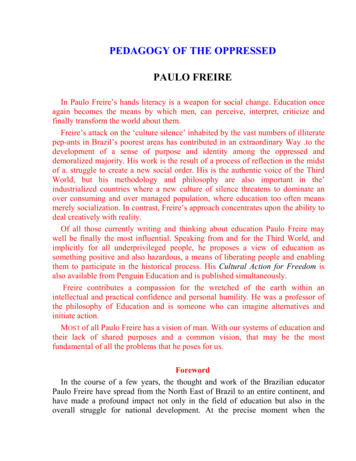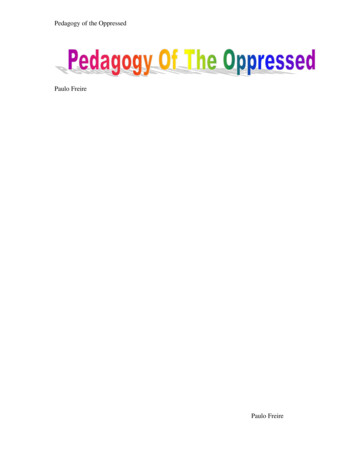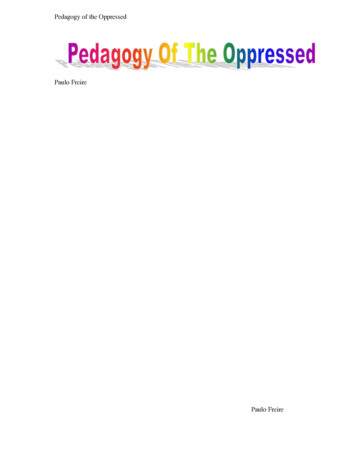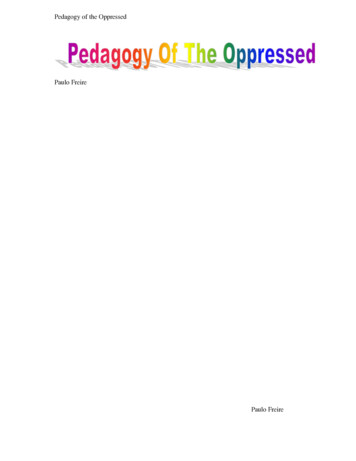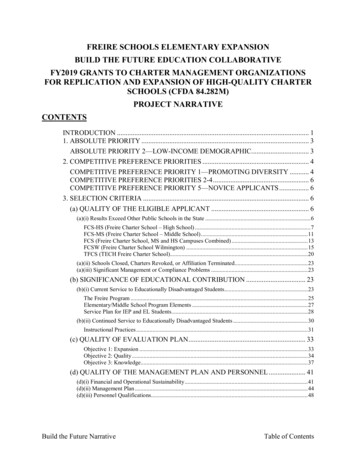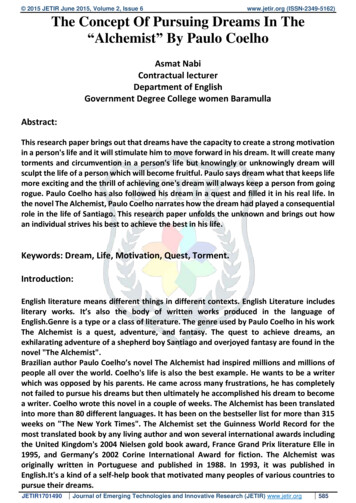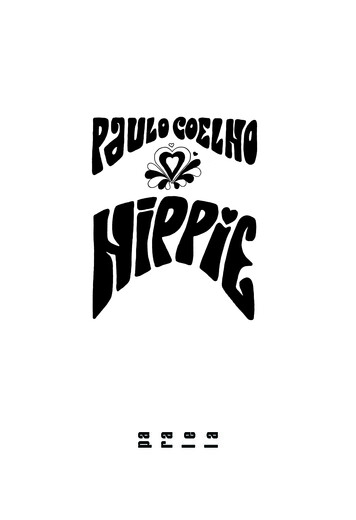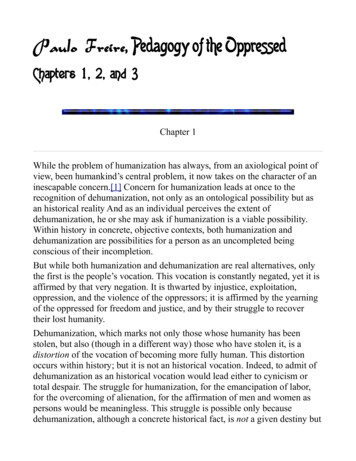
Transcription
Paulo Freire, Pedagogy of the OppressedChapters 1, 2, and 3Chapter 1While the problem of humanization has always, from an axiological point ofview, been humankind’s central problem, it now takes on the character of aninescapable concern.[1] Concern for humanization leads at once to therecognition of dehumanization, not only as an ontological possibility but asan historical reality And as an individual perceives the extent ofdehumanization, he or she may ask if humanization is a viable possibility.Within history in concrete, objective contexts, both humanization anddehumanization are possibilities for a person as an uncompleted beingconscious of their incompletion.But while both humanization and dehumanization are real alternatives, onlythe first is the people’s vocation. This vocation is constantly negated, yet it isaffirmed by that very negation. It is thwarted by injustice, exploitation,oppression, and the violence of the oppressors; it is affirmed by the yearningof the oppressed for freedom and justice, and by their struggle to recovertheir lost humanity.Dehumanization, which marks not only those whose humanity has beenstolen, but also (though in a different way) those who have stolen it, is adistortion of the vocation of becoming more fully human. This distortionoccurs within history; but it is not an historical vocation. Indeed, to admit ofdehumanization as an historical vocation would lead either to cynicism ortotal despair. The struggle for humanization, for the emancipation of labor,for the overcoming of alienation, for the affirmation of men and women aspersons would be meaningless. This struggle is possible only becausedehumanization, although a concrete historical fact, is not a given destiny but
the result of an unjust order that engenders violence in the oppressors, whichin turn dehumanizes the oppressed.Because it is a distortion of being more fully human, sooner or later beingless human leads the oppressed to struggle against those who made them so.In order for this struggle to have meaning, the oppressed must not in seekingto regain their humanity (which is a way to create it), become in turnoppressors of the oppressors, but rather restorers of the humanity of both.This, then, is the great humanistic and historical task of the oppressed: toliberate themselves and their oppressors as well. The oppressors, whooppress, exploit, and rape by virtue of their power; cannot find in this powerthe strength to liberate either the oppressed or themselves. Only power thatsprings from the weakness of the oppressed will be sufficiently strong to freeboth. Any attempt to “soften” the power of the oppressor in deference to theweakness of the oppressed almost always manifests itself in the form of falsegenerosity; indeed, the attempt never goes beyond this. In order to have thecontinued opportunity to express their “generosity,” the oppressors mustperpetuate injustice as well. An unjust social order is the permanent fount ofthis “generosity” which is nourished by death, despair, and poverty. That iswhy the dispensers of false generosity become desperate at the slightestthreat to its source.True generosity consists precisely in fighting to destroy the causes whichnourish false charity. False charity constrains the fearful and subdued, the“rejects of life” to extend their trembling hands. True generosity lies instriving so that these hands — whether of individuals or entire peoples —need be extended less and less in supplication, so that more and more theybecome human hands which work and, working, transform the world.This lesson and this apprenticeship must come, however, from the oppressedthemselves and from those who are truly in solidarity with them. Asindividuals or as peoples, by fighting for the restoration of their humanitythey will be attempting the restoration of true generosity. Who are betterprepared than the oppressed to understand the terrible significance of anoppressive society? Who suffer the effects of oppression more than theoppressed? Who can better understand the necessity of liberation? They willnot gain this liberation by chance but through the praxis of their quest for it,through their recognition of the necessity to fight for it. And this fight,
because of the purpose given it by the oppressed, will actually constitute anact of love opposing the lovelessness which lies at the heart of the oppressors’violence, lovelessness even when clothed in false generosity.But almost always, during the initial stage of the struggle, the oppressed,instead of striving for liberation, tend themselves to become oppressors, or“sub-oppressors.” The very structure of their thought has been conditioned bythe contradictions of the concrete, existential situation by which they wereshaped. Their ideal is to be men; but for them, to be men is to be oppressors.This is their model of humanity. This phenomenon derives from the fact thatthe oppressed, at a certain moment of their existential experience, adopt anattitude of “adhesion” to the oppressor. Under these circumstances theycannot “consider” him sufficiently clearly to objectivize him — to discoverhim “outside” themselves. This does not necessarily mean that the oppressedare unaware that they are downtrodden. But their perception of themselves asoppressed is impaired by their submersion in the reality of oppression. At thislevel, their perception of themselves as opposites of the oppressor does notyet signify engagement in a struggle to overcome the contradiction;[2] theone pole aspires not to liberation, but to identification with its opposite pole.In this situation the oppressed do not see the “new man as the person to beborn from the resolution of this contradiction, as oppression gives way toliberation. For them, the new man or woman themselves become oppressors.Their vision of the new man or woman is individualistic; because of theiridentification with the oppressor they have no consciousness of themselves aspersons or as members of an oppressed class. It is not to become free thatthey want agrarian reform, but in order to acquire land and thus becomelandowners — or; more precisely, bosses over other workers. It is a rarepeasant who, once “promoted” to overseer, does not become more of a tyranttowards his former comrades than the owner himself. This is because thecontext of the peasant’s situation, that is, oppression, remains unchanged. Inthis example, the overseer, in order to make sure of his job, must be as toughas the owner — and more so. Thus is illustrated our previous assertion thatduring the initial stage of their struggle the oppressed find in the oppressortheir model of “manhood.”Even revolution, which transforms a concrete situation of oppression byestablishing the process of liberation, must confront thus phenomenon. Many
of the oppressed who directly or indirectly participate in revolution intend —conditioned by the myths of the old order — to make it their privaterevolution. The shadow of their former oppressor is still cast over them.The “fear of freedom” which afflicts the oppressed,[3]a fear which mayequally well lead them to desire the role of oppressor or bind them to the roleof oppressed, should be examined. One of the basic elements of therelationship between oppressor and oppressed is prescription. Everyprescription represents the imposition of one individual’s choice uponanother, transforming the consciousness of the person prescribed to into onethat conforms with the prescriber’s consciousness. Thus, the behavior of theoppressed is a prescribed behavior, following as it does the guidelines of theoppressor.The oppressed, having internalized the image of the oppressor and adoptedhis guidelines, are fearful of freedom. Freedom would require them to ejectthis image and replace it with autonomy and responsibility. Freedom isacquired by conquest, not by gift. It must be pursued constantly andresponsibly. Freedom is not an ideal located outside of man; nor is it an ideawhich becomes myth. It is rather the indispensable condition for the quest forhuman completion.To surmount the situation of oppression, people must first critically recognizeits causes, so that through transforming action they can create a newsituation, one which makes possible the pursuit of a fuller humanity. But thestruggle to be more fully human has already begun in the authentic struggleto transform the situation. Although the situation of oppression is adehumanized and dehumanizing totality affecting both the oppressors andthose whom they oppress, it is the latter who must, from their stifledhumanity, wage for both the struggle for a fuller humanity; the oppressor,who is himself dehumanized because he dehumanizes others, is unable tolead this struggle.However, the oppressed, who have adapted to the structure of domination inwhich they are immersed, and have become resigned to it, are inhibited fromwaging the struggle for freedom so long as they feel incapable of running therisks it requires. Moreover, their struggle for freedom threatens not only theoppressor, but also their own oppressed comrades who are fearful of stillgreater repression. When they discover within themselves the yearning to be
free, they perceive that this yearning can be transformed into reality onlywhen the same yearning is aroused in their comrades. But while dominatedby the fear of freedom they refuse to appeal to others, or to listen to theappeals of others, or even to the appeals of their own conscience. They prefergregariousness to authentic comradeship; they prefer the security ofconformity with their state of unfreedom to the creative communionproduced by freedom and even the very pursuit of freedom.The oppressed suffer from the duality which has established itself in theirinnermost being. They discover that without freedom they cannot existauthentically. Yet, although they desire authentic existence, they fear it. Theyare at one and the same time themselves and the oppressor whoseconsciousness they have internalized. The conflict lies in the choice betweenbeing wholly themselves or being divided; between ejecting the oppressorwithin or not ejecting them; between human solidarity or alienation; betweenfollowing prescriptions or having choices; between being spectators oractors; between acting or having the illusion of acting through the action ofthe oppressors; between speaking out or being silent, castrated in their powerto create and re-create, in their power to transform the world. This is thetragic dilemma of the oppressed which their education must take intoaccount.This book will present some aspects of what the writer has termed thepedagogy of the oppressed, a pedagogy which must be forged with, not for,the oppressed (whether individuals or peoples) in the incessant struggle toregain their humanity. This pedagogy makes oppression and its causes objectsof reflection by the oppressed, and from that reflection will come theirnecessary engagement in the struggle for their liberation. And in the strugglethis pedagogy will be made and remade.The central problem is this: How can the oppressed, as divided, unauthenticbeings, participate in developing the pedagogy of their liberation? Only asthey discover themselves to be “hosts” of the oppressor can they contribute tothe midwifery of their liberating pedagogy. As long as they live in the dualityin which to be is to be like, and to be like is to be like the oppressor, thiscontribution is impossible. The pedagogy of the oppressed is an instrumentfor their critical discovery that both they and their oppressors aremanifestations of dehumanization.
Liberation is thus a childbirth, and a painful one. The man or woman whoemerges is a new person, viable only as the oppressor-oppressedcontradiction is superseded by the humanization of all people. Or to put itanother way the solution of this contradiction is born in the labor whichbrings into the world this new being: no longer oppressor nor longeroppressed, but human in the process of achieving freedom.This solution cannot be achieved in idealistic terms. In order for theoppressed to be able to wage the struggle for their liberation they mustperceive the reality of oppression not as a closed world from which there isno exit, but as a limiting situation which they can transform. This perceptionis a necessary but not a sufficient condition for liberation; it must become themotivating force for liberating action. Nor does the discovery by theoppressed that they exist in dialectical relationship to the oppressor, as hisantithesis that without them the oppressor could not exist[4] — in itselfconstitute liberation. The oppressed can overcome the contradiction in whichthey are caught only when this perception enlists them in the struggle to freethemselves.The same is true with respect to the individual oppressor as person.Discovering himself to be an oppressor may cause considerable anguish, butit does not necessarily lead to solidarity with the oppressed. Rationalizing hisguilt through paternalistic treatment of the oppressed, all the while holdingthem fast in a position of dependence, will not do. Solidarity requires that oneenter into the situation of those with whom one is in solidarity; it is a radicalposture. If what characterizes the oppressed is their subordination to theconsciousness of the master, as Hegel affirms,[5] true solidarity with theoppressed means fighting at their side to transform the objective realitywhich has made them these “beings for another”. The oppressor is insolidarity with the oppressed only when he stops regarding the oppressed asan abstract category and sees them as persons who have been unjustly dealtwith, deprived of their voice, cheated in the sale of their labor — when hestops making pious, sentimental, and individualistic gestures and risks an actof love. True solidarity is found only in the plenitude of this act of love, in itsexistentiality in its praxis. To affirm that men and women are persons and aspersons should be free, and yet to do nothing tangible to make thisaffirmation a reality, is a farce.
Since it is a concrete situation that the oppressor-oppressed contradiction isestablished, the resolution of this contradiction must be objectively verifiable.Hence, the radical requirement — both for the individual who discovershimself or herself to be an oppressor and for the oppressed — that theconcrete situation which begets oppression must be transformed.To present this radical demand for the objective transformation of reality tocombat subjectivist immobility which would divert the recognition ofoppression into patient waiting for oppression to disappear by itself is not todismiss the role of subjectivity in the struggle to change structures. On thecontrary one cannot conceive of objectivity without subjectivity. Neither canexist without the other, nor can they be dichotomized. The separation ofobjectivity from subjectivity, the denial of the latter when analyzing reality oracting upon it, is objectivism. On the other hand, the denial of objectivity inanalysis or action, resulting in a subjectivism which leads to solipsisticpositions, denies action itself by denying objective reality. Neitherobjectivism nor subjectivism, nor yet psychologism is propounded here, butrather subjectivity and objectivity in constant dialectical relationship.To deny the importance of subjectivity in the process of transforming theworld and history is naive and simplistic. It is to admit the impossible: aworld without people. This objectivistic position is as ingenuous as that ofsubjectivism, which postulates people without a world. World and humanbeings do not exist apart from each other, they exist in constant interaction.Man does not espouse such a dichotomy; nor does any other critical, realisticthinker. What Marx criticized and scientifically destroyed was notsubjectivity, but subjectivism and psychologism. Just as objective socialreality exists not by chance, but as the product of human action, so it is nottransformed by chance. If humankind produce social reality (which in the“inversion of the praxis” turns back upon them and conditions them), thentransforming that reality is an historical task, a task for humanity.Reality which becomes oppressive results in the contradistinction of men asoppressors and oppressed The latter, whose task it is to struggle for theirliberation together with those who show true solidarity, must acquire acritical awareness of oppression through the praxis of this struggle. One ofthe gravest obstacles to the achievement of liberation is that oppressivereality absorbs those within it and thereby acts to submerge human beings’
consiousness.[6] Functionally, oppression is domesticating. To no longer beprey to its force, one must emerge from it and turn upon it. This can be doneonly by means of the praxis: reflection and action upon the world in order totransform it.Hay que hacer al opresion real todavia mas opresiva anadiendo a aquella laconciencia de la opresion haciendo la infamia todavia mas infamante, alpregonar1a.[7]Making “real oppression more oppressive still by adding to it the realizationof oppression” corresponds to the dialectical relation between the subjectiveand the objective. Only in this interdependence is an authentic praxispossible, without which it is impossible to resolve the oppressor-oppressedcontradiction. To achieve this goal, the oppressed must confront realitycritically, simultaneously objectifying and acting upon that reality. A mereperception of reality not followed by this critical intervention will not lead toa transformation of objective reality — precisely because it is not a trueperception. This is the case of a purely subjectivist perception by someonewho forsakes objective reality and creates a false substitute.A different type of false perception occurs when a change in objective realitywould threaten the individual or class interests of the perceiver. In the firstinstance, there is no critical intervention in reality because that reality isfictitious; there is none in the second instance because intervention wouldcontradict the class interests of the perceiver In the latter case the tendency ofthe perceiver is to behave “neurotically.” The fact exists; but both the fact andwhat may result from it may be prejudicial to the person. Thus it becomesnecessary not precisely to deny the fact, but to “see it differently.” Thisrationalization as a defense mechanism coincides in the end withsubjectivism. A fact which is not denied but whose truths are rationalizedloses its objective base. It ceases to be concrete and becomes a myth createdin defense of the class of the perceiver.Herein lies one of the reasons for the prohibitions and the difficulties (to bediscussed at length in Chapter 4) designed to dissuade the people fromcritical intervention in reality. The oppressor knows full well that thisintervention would not be to his interest. What is to his interest is for thepeople to continue in a state of submersion, impotent in the face ofoppressive reality. Of relevance here is Lukacs’ warning to the revolutionary
party:. il doit, pour employer les mots de Marx, expliquer aux masses leur propreaction non seulement afin d’assurer la continuite des experiencesrevolutionnaires du proletariat, mais aussi d’activer consciemment ledeveloppement ulterieur de ces experiences.[8]In affirming this necessity, Lukacs is unquestionably posing the problem ofcritical intervention. “To explain to the masses their own action” is to clarifyand illuminate that action, both regarding its relationship to the objective actsby which it was prompted, and regarding its purposes. The more the peopleunveil this challenging reality which is to be the object of their transformingaction, the more critically they enter that reality. In this way they are“consciously activating the subsequent development of their experiences.”There would be no human action if there were no objective reality; no worldto be the “not I” of the person and to challenge them; just as there would beno human action if humankind were not a “project” if he or she were not ableto transcend himself or herself, if one were not able to perceive reality andunderstand it in order to transform it.In dialectical thought, world and action are intimately interdependent. Butaction is human only when it is not merely an occupation but also apreoccupation, that is, when it is not dichotomized from reflection.Reflection, which is essential to action, is implicit in Lukacs’ requirement of“explaining to the masses their own action,” just as it is implicit in thepurpose he attributes to this explanation: that of “consciously activating thesubsequent development of experience.”For us, however, the requirement is seen not in terms of explaining to, butrather dialoguing with the people about their actions. In any event, no realitytransforms itself,[9]and the duty which Lukacs ascribes to the revolutionaryparty of “explaining to the masses their own action” coincides with ouraffirmation of the need for the critical intervention of the people in realitythrough the praxis. The pedagogy of the oppressed, which is the pedagogy ofpeople engaged in the fight for their own liberation, has its roots here. Andthose who recognize, or begin to recognize, themselves as oppressed must beamong the developers of this pedagogy. No pedagogy which is trulyliberating can remain distant from the oppressed by treating them asunfortunates and by presenting for their emulation models from among the
oppressors. The oppressed must be their own example in the struggle for theirredemption.The pedagogy of the oppressed, animated by authentic, humanist (nothumanitarian) generosity, presents itself as a pedagogy of humankind.Pedagogy which begins with the egoistic interests of the oppressors (anegoism cloaked in the false generosity of paternalism) and makes of theoppressed the objects of its humanitarianism, itself maintains and embodiesoppression. It is an instrument of dehumanization. This is why, as weaffirmed earlier, the pedagogy of the oppressed cannot be developed orpracticed by the oppressor. It would be a contradiction in terms if theoppressors not only defended but actually implemented a liberatingeducation.But if the implementation of a liberating education requires political powerand the oppressed have none, how then is it possible to carry out thepedagogy of the oppressed prior to the revolution? This is a question of thegreatest importance, the reply to which is at least tentatively outlined inChapter 4. One aspect of the reply is to be found in the distinction betweensystematic education, which can only be changed by political power, andeducational projects, which should be carried out with the oppressed in theprocess of organizing them.The pedagogy of the oppressed, as a humanist and libertarian pedagogy, hastwo distinct stages. In the first, the oppressed unveil the world of oppressionand through the praxis commit themselves to its transformation. In the secondstage, in which the reality of oppression has already been transformed, thispedagogy ceases to belong to the oppressed and becomes a pedagogy of allpeople in the process of permanent liberation. In both stages, it is alwaysthrough action in depth that the culture of domination is culturallyconfronted.[10]In the first stage this confrontation occurs through the changein the way the oppressed perceive the world of oppression; in the secondstage, through the expulsion of the myths created and developed in the oldorder, which like specters haunt the new structure emerging from therevolutionary transformation.The pedagogy of the first stage must deal with the problem of the oppressedconsciousness and the oppressor consciousness, the problem of men andwomen who oppress and men and women who suffer oppression. It must take
into account their behavior; their view of the world, and their ethics. Aparticular problem is the duality of the oppressed: they are contradictory,divided beings, shaped by and existing in a concrete situation of oppressionand violence.Any situation in which “A” objectively exploits “B” or hinders his and herpursuit of self-affirmation as a responsible person is one of oppression. Sucha situation in itself constitutes violence even when sweetened by falsegenerosity; because it interferes with the individual’s ontological andhistorical vocation to be more fully human. With the establishment of arelationship of oppression, violence has already begun. Never in history hasviolence been initiated by the oppressed. How could they be the initiators, ifthey themselves are the result of violence? How could they be the sponsors ofsomething whose objective inauguration called forth their existence asoppressed? There would be no oppressed had there been no prior situation ofviolence to establish their subjugation.Violence is initiated by those who oppress, who exploit, who fail to recognizeothers as persons — not by those who are oppressed, exploited, andunrecognized. It is not the unloved who initiate disaffection, but those whocannot love because they love only themselves. It is not the helpless, subjectto terror, who initiate terror, but the violent, who with their power create theconcrete situation which begets the “rejects of life.” It is not the tyrannizedwho initiate despotism, but the tyrants. It is not the despised who initiatehatred, but those who despise. It is not those whose humanity is denied themwho negate humankind, but those who denied that humanity (thus negatingtheir own as well). Force is used not by those who have become weak underthe preponderance of the strong, but by the strong who have emasculatedthem.For the oppressors, however, it is always the oppressed (whom theyobviously never call “the oppressed” but — depending on whether they arefellow countrymen or not — “those people” or “the blind and enviousmasses” or “savages” or “natives” or “subversives”) who are disaffected, whoare “violent,” “barbaric,” “wicked,” or “ferocious” when they react to theviolence of the oppressors.Yet it is — paradoxical though it may seem — precisely in the response of
the oppressed to the violence of their oppressors that a gesture of love may befound. Consciously or unconsciously, the act of rebellion by the oppressed(an act which is always, or nearly always, as violent as the initial violence ofthe oppressors) can initiate love. Whereas the violence of the oppressorsprevents the oppressed from being fully human, the response of the latter tothis violence is grounded in the desire to pursue the right to be human. As theoppressors dehumanize others and violate their rights, they themselves alsobecome dehumanized. As the oppressed, fighting to be human, take away theoppressors’ power to dominate and suppress, they restore to the oppressorsthe humanity they had lost in the exercise of oppression.It is only the oppressed who, by freeing themselves, can free their oppressors.The latter, as an oppressive class, can free neither others nor themselves. It istherefore essential that the oppressed wage the struggle to resolve thecontradiction in which they are caught; and the contradiction will be resolvedby the appearance of the new man: neither oppressor nor oppressed, but manin the process of liberation. If the goal of the oppressed is to become fullyhuman, they will not achieve their goal by merely reversing the terms of thecontradiction, by simply changing poles.This may seem simplistic; it is not. Resolution of the oppressor-oppressedcontradiction indeed implies the disappearance of the oppressors as adominant class. However, the restraints imposed by the former oppressed ontheir oppressors, so that the latter cannot reassume their former position, donot constitute oppression. An act is oppressive only when it prevents peoplefrom being more fully human. Accordingly, these necessary restraints do notin themselves signify that yesterday’s oppressed have become today’soppressors. Acts which prevent the restoration of the oppressive regimecannot be compared with those which create and maintain it, cannot becompared with those by which a few men and women deny the majority theright to be human.However, the moment the new regime hardens into a dominating“bureaucracy”[11] the humanist dimension of the struggle is lost and it is nolonger possible to speak of liberation. Hence our insistence that the authenticsolution of the oppressor-oppressed contradiction does not lie in a merereversal of position, in moving from one pole to the other. Nor does it lie inthe replacement of the former oppressors with new ones who continue to
subjugate the oppressed — all in the name of their liberation.But even when the contradiction is resolved authentically by a new situationestablished by the liberated laborers, the former oppressors do not feelliberated. On the contrary, they genuinely consider themselves to beoppressed. Conditioned by the experience of oppressing others, any situationother than their former seems to them like oppression. Formerly, they couldeat, dress, wear shoes, be educated, travel, and hear Beethoven; whilemillions did not eat, had no clothes or shoes, neither studied nor traveled,much less listened to Beethoven. Any restriction on this way of life, in thename of the rights of the community, appears to the former oppressors as aprofound violation of their individual right — although they had no respectfor the millions who suffered and died of hunger, pain, sorrow, and despair.For the oppressors, “human beings” refers only to themselves; other peopleare “things.” For the oppressors, there exists only one right: their right to livein peace, over against the right, not always even recognized, but simplyconceded, of the oppressed to survival. And they make this concession onlybecause the existence of the oppressed
regain their humanity. This pedagogy makes oppression and its causes objects of reflection by the oppressed, and from that reflection will come their necessary engagement in the struggle for their liberation. And in the struggle this pedagogy will be made and remade. The central problem is this: How can the oppressed, as divided, unauthentic



